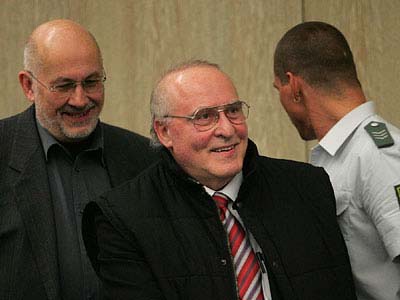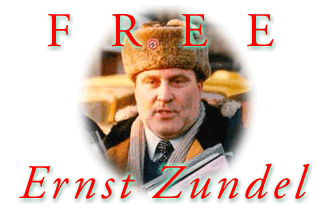|
|
November 10, 2005

Horst Mahler and Ernst Zündel
Good Morning from the Zundelsite:
It is still very early morning - and it is my pleasure to
send you yet another account of the first day of the Zundel/Holocaust Trial
on German soil. Before I let you read it, I would like to share a few
observations of my own, not having been at the trial but having seen a few
myself and heard many accounts of previous Holocaust trials in Canada.
This trial is different, just as I predicted it would be.
First of all, notice the Jewish absence. There might well
have been Jewish reporters; I am not talking about those - I am talking
about the ever-present “Holocaust survivors" who would give mournful,
highly welcome interviews to media in Canada. As far as I know, there was
only one person identified by some members of the public as a Jew -
allegedly, he stood at the entrance and took pictures of everybody entering
the court room. He took flight - he literally ran away! - when one of our
own returned the favor and tried to snap a picture of him.
Secondly, the riff-raff was notably absent. In Canada, B'nai
Brith & Co used to come to the hearing with the ARA always in tow,
hoodlums who obliged their handlers with glowering looks at the Zundelists
and, once, bringing a rat in a brown bag, intending to let it let loose.
(The poor critter was taken into custody, I understand, by one of the guards
at the door ...) Here, the ARA-like riff-raff is called “die Chaoten"
who, in Canada at least, were said to be “paid" with freebie
Hamburgers and such after each obligatory show of public intimidation.
Thirdly, in Canada at least, there were no open threats
against the defense, as happened on this first day, in full view of the
world. In the past, there was covert harassment against Doug Christie, and
none-too-subtle sneers in the media as “the attorney who defended the
likes of Ernst Zundel..." upon which everybody was supposed to hold
their noses. Here, the strategy seems to have been, in full few of a media
corps who pricked up their ears, as judged by some of their comments to me,
to decimate the defense team right at the outset, replacing them with
minions of their choice - in other words, to swing the “Auschwitz
cudgel" - “Auschwitzkeule", as it is called in Germany in the
vernacular - against the Zundel Team and against any revelations that are
bound to come out if this charade against a person's human rights, as
guaranteed by international agreements.
This is probably not the place for me to confess, but I feel
for Dr. Meinerzhagen. It must not be easy on one's ego to have the world
take notice of what kind of sleazy job has been assigned to him. I believe
he is an intelligent man of some soul and discernment; this could be his
chance to enter history with honor and do right by the people of his
homeland.
So. That's my take.
Below is yet another courtroom visitor's take on what
transpired on Day One of Zundel Holocaust Trial Number Three:
[START]
The Zündel-Trial
Account of the First Hearing - Regional Court Mannheim,
08.11.05
By Markus Haverkamp
On Tuesday morning roughly 80 supporters of Ernst Zündel
and 35 representatives of the media met at the Regional Court Mannheim, a
court notorious for its zeal and fervour in persecuting Revisionists. The
atmosphere was extraordinarily pleasant, the supporters having come from
as far as Canada, the UK, France and Switzerland. Following the usual
security procedures by the police, who were very friendly indeed, the
hearing began shortly after 09.00 when the judge, Dr. Meinerzhagen, his
two colleagues and two jurors entered the courtroom. Ernst Zündel,
wearing a blazer and tie, made a healthy and confident impression; he was
represented by Miss Sylvia Stolz, whom Ernst Zündel had appointed as his
mandatory lawyer, as well as Jürgen Rieger and Dr. Herbert Schaller
(Austria) as his lawyers of choice. Miss Stolz' assistant was Horst
Mahler. Ernst Zündel was thus represented by possibly the most
experienced and highly qualified team of lawyers for dealing with
Holocaust persecution and nationalism.
The judge opened the hearing by taking down Ernst
Zündel's name, date of birth, profession and address. Having done so, Dr.
Meinerzhagen proceeded to attack the defence team, by first reading out
aloud Horst Mahler's prohibition to practice his profession that had been
passed by the Local Court Tiergarten, and extensively quoting Herr
Mahler's remarks on Revisionism, the Jewish Question and the status of the
German Reich. He then demanded that Herr Mahler be relieved of his
appointment as Miss Stolz' assistant. Sylvia Stolz pointed out that owing
to the fact that Horst Mahler was not acting as a lawyer but merely as her
assistant there were no grounds for dismissing Herr Mahler. The judge
retorted that it would seem that Mahler's influence on the defence is
considerable, to which Sylvia Stolz replied that it is alone her business
which writings she makes use of in her defence and that this is her
responsibility. Upon this, the judge threatened to have Herr Mahler
removed by force and put into custody for a day. The public shook their
heads with disbelief at hearing this. At this point, Jürgen Rieger
pointed out that such attacks against the defence had not even taken place
in the Gulag. As Sylvia Stolz continued to be persistent in having Mahler
as her assistant, the judge ordered the police to remove Mahler from the
courtroom, at which point (the guards were already standing behind Horst
Mahler) Miss Stolz stated that as it was her decision, not the court's,
and that seeing as they were being coerced by force, she would herewith
relieve Mahler from his duty as assistant. Mahler then took a seat in the
public area. All this caused an uproar from the public provoking the judge
to threaten to lock the public out.
Dr Meinerzhagen, however, was merely warming up.
The judge then read out the court decision from 07.11.05
where it was decided that the petition of the defence to have Zündel
released from custody for the time being until the Federal Constitutional
Court decides whether §130 Penal Code (Holocaust muzzle) is congruent
with §5 Basic Law (freedom of opinion and speech) was refused. The judge
then made it clear that all "incitement to hatred" by the
defence would be vigorously suppressed and then stated that the defence
was using terms and stating matters which where endangering the defence of
being itself accused of violating §130 Penal Code. He here said that he
would not listen to "pseudo-scientific views since the Holocaust is a
historically ascertained fact" (this caused the public to roar with
laughter).
Dr Meinerzhagen continued by saying that he was not sure
that Sylvia Stolz is suited to being Ernst Zündel's mandatory lawyer as
she was likely to make herself guilty of the violation of §130;
furthermore, since Ernst Zündel was thus likely to lose his mandatory
lawyer, which would slow the proceedings down, the status of Miss Stolz as
his mandatory lawyer is to be revoked.
After Zündel made it clear that he wishes to be
represented by Miss Stolz, the court took a break to deliberate on this
issue. After its deliberation, the court revoked Miss Stolz' appointment
as Ernst Zündel's mandatory lawyer. Dr Meinerzhagen then proceeded to say
that Jürgen Rieger was not suited as the mandatory lawyer of the accused
either, because it is known that Herr Rieger is of Revisionist opinion and
it is to be feared that he would not be properly objective in the matter.
The judge here cited examples from Jürgen Rieger's past - facts which he
obtained by breaking the data protection laws as Rieger then pointed out.
Moving on to Dr. Schaller, the judge stated that he too
was not suited to be Zündel's mandatory lawyer either, since owing to his
old age it could not be guaranteed that Dr. Schaller would be up to the
job. In his ensuing, powerful and brilliantly delivered statement, Jürgen
Rieger drew the judge's attention to the fact that Konrad Adenauer had
been well into his 70s when first elected as chancellor of Germany, this
as well as many other statements again causing the public to voice their
approval, giggle and laugh.
The purpose of the Judge was all to obvious: by
eliminating Ernst Zündel's brilliant defence team he would be able to
appoint a mandatory defence lawyer of his own choosing, one who would not
make any petitions or place motions to hear evidence, but who would act in
accordance with Dr. Meinerzhagen's designs. The defence, however, refused
to be intimidated by these actions.
After having eliminated the possibility of Zündel having
a mandatory lawyer of his preference, the judge asked how the matter was
to be continued, to which the accused stated that he would dismiss his
third lawyer of choice (Bock, not present at the hearing) and would take
Sylvia Stolz, Jürgen Rieger and Dr. Schaller as lawyers of choice. (Note:
In hearings before a regional court, German law requires that the accused
have a mandatory lawyer; the accused may also have up to three lawyers of
choice). Rieger then pointed [out] that such a decision ought to be left
to the bar, and Miss Stolz added that since the court desires to have a
mandatory lawyer who has Ernst Zündel's trust, the court ought to act
accordingly, unless, of course, the court has other things in mind. At
this juncture, the hearing was interrupted for 90 minutes to allow for
lunch.
During the lunch break, the defence lawyers as well as the
public prosecutor gave interviews to the media. During an interview with
the latter, one of Zündel's supporters, Dirk Heuer, asked the public
prosecutor in front of the cameras: "How can you sleep at
night?" The police led him away on the spot.
After lunch, having again been through the security
screening (the police officials becoming increasingly amicable), we
returned to the courtroom. Jürgen Rieger then proceeded to read out a
petition that the court is prejudiced. The eloquence and emotional power
of Rieger's statements can only be hinted at. After Rieger finished,
Sylvia Stolz made a statement, saying that the defence was being publicly
threatened not to state anything forbidden by the court, and that this is
an outrage and that such thoughts could only be the fruit of a sick mind.
Miss Stolz then petitioned to exclude the public from further hearings on
the grounds that the defence was being threatened by the court of being
persecuted for violation of §130 Penal Code. (Note: This paragraph only
comes into effect when the "crime" is perpetrated in public; by
excluding the public, the defence would be able to voice "forbidden
thoughts" without being liable for persecution). Sylvia Stolz
continued by saying that should the court wish to have a public trial, the
defence team would be in grave danger of persecution.
The court then decided to go into recession until Tuesday
15.11.05, 10.00.
On leaving the courtroom, the sympathy of the police who
had been present throughout the hearing was extraordinary - expressions of
support, pats on the back, etc.
All in all, the day was a huge success. Dr. Meinerzhagen
clearly showed his prejudice and his will to destroy Ernst Zündel's
defence as well as his will not to accept any evidence the defence lawyers
might present in order to defend the accused. Furthermore, the judge
clearly broke the most basic of judicial norms by publicly threatening the
defence before they had even started defending the accused, as well as by
forcing Horst Mahler to leave the floor and revoking Sylvia Stolz'
appointment as mandatory defence lawyer. It was blatantly obvious that
this was to be a show trial.
The defence team put up a brilliant fight; Jürgen Rieger
with his powerful, witty comments and Sylvia Stolz with her quiet, calm
and perfectly determined bearing. The two final petitions by the defence
team were excellent strategic moves: a) the court will have to deal with
the petition that it is prejudiced, i.e. it will have to analyse its
actions and account for them, this being something the court dreads, and
b) by petitioning to exclude the public, Miss Stolz gave the court a
choice: to either exclude the public, in which case the court will be
confronted with the evidence from Germar Rudolf's "Lectures on the
Holocaust" and Horst Mahler's "Motion to Hear Evidence on the
Jewish Question", which would be devastating for the court, as well
as creating waves both in the judicial world as well as in public (why the
secret trial?), or, to include the public in which case the defence team
would be tried itself for presenting its evidence nonetheless, causing
both the public and the judicial world to ponder what is going on. Either
way, the way things look it seems highly unlikely that the court can reach
a decision that truly benefits its plans to lock Ernst Zündel up.
The show trial continues on Tuesday, 15 November 2005 at
the Regional Court Mannheim, 10.00. [I believe it is 9:00 o'clock, as
previously announced.]
[END]
===== ===== =====
|

|
Setting the Record Straight: Letters from Cell # 7
$10 - 180 Pages
Find out who this "premier thought criminal" really is -
how he thinks, how he writes, what he's really saying! You will
be astonished to learn why this man is so feared by the world's
manipulators of your thoughts!
Order form: HTML
format | PDF
Format |
Reminder:
Help free Ernst Zundel, Prisoner of Conscience. His
prison sketches - now on-line and highly popular - help pay for his defence.
Take a look - and tell a friend.
http://www.zundelsite.org/gallery/donations/index.html
|

Please write to Ernst Zündel, let him know that he is not
alone:
Ernst Zundel
JVA Mannheim
Justiz-Vollzugsanstalt
Herzogenried Strasse 111
D 68169 Mannheim
Germany
|
|
|